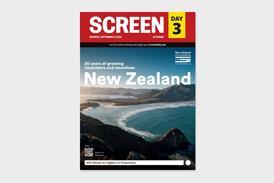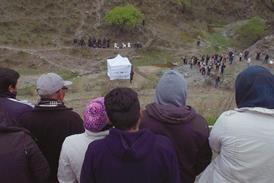
The 50th anniversary edition of Toronto International Film Festival (TIFF, September 4-14) wrapped last week. Screen looks at some of the key take-aways.
Awards season launchpad?
TIFF has fallen behind rival festivals in awards launchpad bragging rights, but it has a unique strength that stands it in good stead. This year’s 50th anniversary edition did not secure world premiere slots for any of the most coveted prestige films, reflecting the ongoing power shift in favour of Venice, to some extent Telluride, New York, and, particularly in the last three years, Cannes. This year’s crop of TIFF world premieres garnered admirers and some may well gather steam in the months ahead, but it was hard to think of one that truly broke out. Among the notable world premieres were Nia DaCosta’s Hedda starring Tessa Thompson at Amazon MGM Studios, Brendan Fraser in Searchlight’s Rental Family from Hikari, Paul Greengrass’s The Lost Bus from Apple starring Matthew McConaughey and America Ferrera, Derek Cianfrance’s Roofman with Channing Tatum at Paramount, and David Michôd’s Christy starring Sydney Sweeney. Rian Johnson’s Wake Up Dead Man: A Knives Out Mystery also premiered in Toronto, although the Netflix whodunnit is more of a crowd-pleaser.
In contrast, the awards bait films that Toronto’s passionate hordes of cinephiles arguably responded to most enthusiastically were Chloe Zhao’s Hamnet, Guillermo del Toro’s Frankenstein, Joachim Trier’s Sentimental Value, Kleber Mendonça Filho’s The Secret Agent, Jafar Panahi’s Palme d’Or winner It Was Just An Accident, and Kaouther Ben Hania’s The Voice Of Hind Rajab, among others. These films premiered in Venice, Telluride, and Cannes, where the response was immediate, thrusting them into the awards conversation. And therein lies the ongoing opportunity for TIFF: through its vast selection, the festival continues to mine awards season relevance as an endorser, an amplifier of exciting prospects that debuted elsewhere. (Though not all – Jay Kelly, Bugonia, and A House Of Dynamite had already premiered and skipped TIFF.) As a beloved public-facing festival attended by thousands of film fanatics – one of TIFF’s great and most enduring strong suits – the noise generated around these (mostly Canadian premiere) screenings gave distributors a timely temperature check and told them what they needed to know about the early status of their contenders.
The TIFF People’s Choice Award remains a strong bellwether
And on that note, few awards at this stage of the season offer as reliable a guide of a film’s potential awards season trajectory as TIFF’s People’s Choice Award. This year the recognition went to Zhao’s crowd-pleasing tear-jerker Hamnet. In Telluride the world premiere turned Jessie Buckley into the lead actress Oscar frontrunner overnight. In Toronto, three sold-out screenings confirmed the credentials of Focus Features’ period drama as the talk expanded beyond Buckley’s performance to the film’s robust overall prospects. And those prospects look even sweeter now, because over the last 15 years all but two TIFF audience award winners have earned a best picture Oscar nomination. Three have gone on to claim the Academy Award for best picture: Zhao’s 2020 selection Nomadland, Steve McQueen’s 12 Years A Slave in 2013, and Peter Farrelly’s 2018 premiere Green Book.
A sleepy US acquisitions market
Given the ongoing reticence of American buyers, especially at a time when streamers are low-balling pay-TV fees that help theatrical buyers fork out a minimum guarantee, it is no longer surprising to hear that deals are thin on the ground at a festival or market. And so it was in Toronto, where in fairness acquisitions executives from many companies arrived with pretty full slates, while others took an opportunistic approach. In that vein, Focus Features sparked headlines with its pursuit of YouTube sensation Curry Barker’s Midnight Madness hit Obsession. At time of writing the company was still locked in exclusive negotiations to pay what sources say is somewhere between $10m and $15m for most of the world on a commercial box office play.
Speaking on a panel, Sony Pictures Classics’ Dylan Leiner bemoaned gloomy stories in the trade press and reminded that acquisitions is a year-round business. True, but for the record let it be known that in a festival of more than 200 films with lots still available, only two theatrical deals have properly closed since the start of this year’s festival. Both involve the nascent US distributor Row K, which like all newbies was eager to make a statement. The company, backed by Media Capital Technologies and led by president and studio veteran Megan Colligan, acquired North American rights on the ground to Gus Vant Sant’s Dead Mans’ Wire, paying mid-seven figures for a film that premiered in Venice and was not seen by lots of US buyers on the Lido. On September 15 the company announced a second acquisition, taking US rights to the coming-of-age drama Charlie Harper. Teddy Schwarzman’s new US distribution division at Black Bear announced at the start of the festival that it had taken on US rights to Christy, which the company produced, financed, and sells internationally. It originally explored putting the film on the market before deciding to self-distribute, which says a lot about the air of caution that hovers over the US acquisitions sector.
Protests and ‘The Road Between Us’
Politics are part-and-parcel of major international festivals these days and Toronto saw its fair share of activity. A nighttime pro-Palestinian gathering took place outside TIFF Lightbox festival HQ on the first Sunday night (September 7) in opposition to the ongoing war in Gaza and the inclusion of Barry Avrich’s documentary The Road Between Us: The Ultimate Rescue. A few days later (September 10), vocal pro-Palestinian and pro-Israeli supporters faced each other across a street from separate protest zones outside Roy Thomson Hall ahead of the afternoon world premiere of Avrich’s documentary, about a retired Israeli general’s mission to save family members during the October 7 2023 Hamas attacks.
Avrich’s film was pulled by TIFF prior to the festival, officially on the grounds that it did not meet “conditions that were requested”. During the ensuing back and forth between the festival and filmmakers there was talk of concern relating to rights clearances of footage from Hamas body cameras. This was a red herring – Avrich quipped during an Industry Conference discussion that as far as he knew Hamas did not have a licensing division, while CEO Cameron Bailey told Toronto’s The Globe And Mail that he never asked the filmmakers for that kind of clearance; rather he sought certain, unspecified legal assurances. Bailey was caught between a rock and a hard place: on one side he faced internal opposition over screening the film, which Screen understands came at least in part from the programming team, while on the other side there were calls to reinstate it by Canadian politicians, Jewish advocacy groups, and most likely the TIFF board (of which Avrich used to be a member). Bailey reinstated the film, and Avrich later revealed Bailey had told him it had been a mistake to withdraw it.
TIFF: The Market coming to Toronto in 2026
The jury (ie. the industry) is still out on what to make of the festival’s big push into market officialdom next year, which in fairness will encompass much more than film packages and explore co-productions, television, immersive content, AI, and more. TIFF paraded its newly-installed market head Charles Tremblay, a former Mubi and Mongrel Media senior executive, to meet the industry. A sales team was stationed at a downtown pop-up a few blocks from TIFF Lightbox to tell potential exhibitors all about the spaces they will be able to rent and for how much. Press were not allowed in, and despite several requests, TIFF is yet to reveal early registration numbers. They are also being coy about the venue for the market. Screen has heard it will all be housed in Metro Toronto Convention Centre, less than a 15-minute walk from TIFF Lightbox and the Hyatt Regency, where most blue chip sellers currently conduct business without having to pay for market badges. The festival has C$23m (USD $16.9m) in Canadian federal government funding allocated to the market over the next three years. Safe to say, a lot is riding on next year.









![[Clockwise from top left]: 'The Voice Of Hind Rajab', 'A House Of Dynamite', 'Jay Kelly', 'After The Hunt', 'The Smashing Machine'](https://d1nslcd7m2225b.cloudfront.net/Pictures/274x183/1/7/0/1459170_veniceawards_837515.jpg)















No comments yet